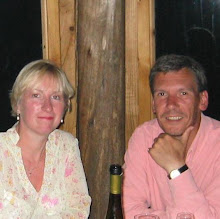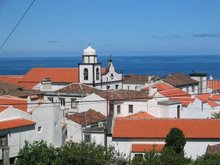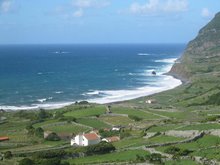strengths
That's another one you can impress your friends with along with leg averages (pace phenotypes).
You're entitled to ask how I know that strengths is the longest word with one vowel and I'll tell you. I stumbled over it while Google searching the longest Scottish placename. You can tell I've got too much time on my hands and I'd be better employed drawing road signs but I had a faint recollection from my 1974 Guiness Book of Records that it's a crofting township on North Uist called Claddach-baleshare.
This is what Claddach-baleshare looks like on Google Earth by the way - rather beautiful, I thought.
Cladach is a gaelic word meaning shore and Claddach-kirkibost is an interesting fusion of Gaelic (Celtic) and Norwegian culture brought to the west coast of Scotland by the vikings as alluded to in History of Scotland Part IX because Kirkibost is pure Norwegian meaning "church settlement".
None of which gets us any closer to the longest Scottish placename although I did discover that that place in Wales with the improbably long name -
Llanfairgriffrhysjonesgarethedwardscharlottechurchgavinhensonrichardburtontonyhopkinsogogogogoch
- is a complete fake. Apparently there's no such place called "St Mary's Church in the valley where the white rabbit jumped over the babbling brook by the dark oak wood [etc.]" and a railway company just made it up as a spoof so that tourists could have their pictures taken next to the improbably long sign at the station.
Anyway - how did I get started on this? I can't remember. But lest I be accused of "blog drift", here's a gratuitous photo of Fajã Grande which is Portuguese for "big flat area between landward cliff and sea"
PS - did Ross and/or Norris McWhirter not get blown up by the IRA and/or was one of them not a member of the BNP or something? Or was that Roy Castle?






2 comments:
It has been a pleasure to check that your blog has been reactivated again. I quit checking your blog 1-2 years ago because of lack of news and today I suddenly remembered of it. It's very interesting to know your adventures as well as daily normal activities in a small island, far different of what you've been used to in Scotland.
Tell me anyway: "What made you find a place with the same weather that you were having in your country? One would think that you wanted to find a more sunny and hot place, such has Algarve or Madeira. Keep up the good work.
Best wishes from the Algarve.
Paulo Ramos (jornal "As Flores" columnist).
Paulo, I suspect Flores' climate is considerably milder than Scotland's! Besides, some of us consider hot weather nothing short of unmitigated torture: I should know, having just spend the better part of last week in 100°F+ temperatures (rising to 40°C in places) in inland central and southern California promoting my latest two book translations!
For us, the best weather was on a day off when one of our hosts drove us over to Half Moon Bay and Pescadero along the central California coastline, to enjoy not only the scenery -- including lots of pelicans and sea lions at the marina, and coast redwood-tree groves just over the hills -- but also the Pacific's cooling sea-breezes.
Post a Comment